ThugPop's meditation
Along with NYMPH, all other content created by THUGPOP will live on his new online platform, ThugPop.farm.
Listen below.
Stay informed on our latest news!
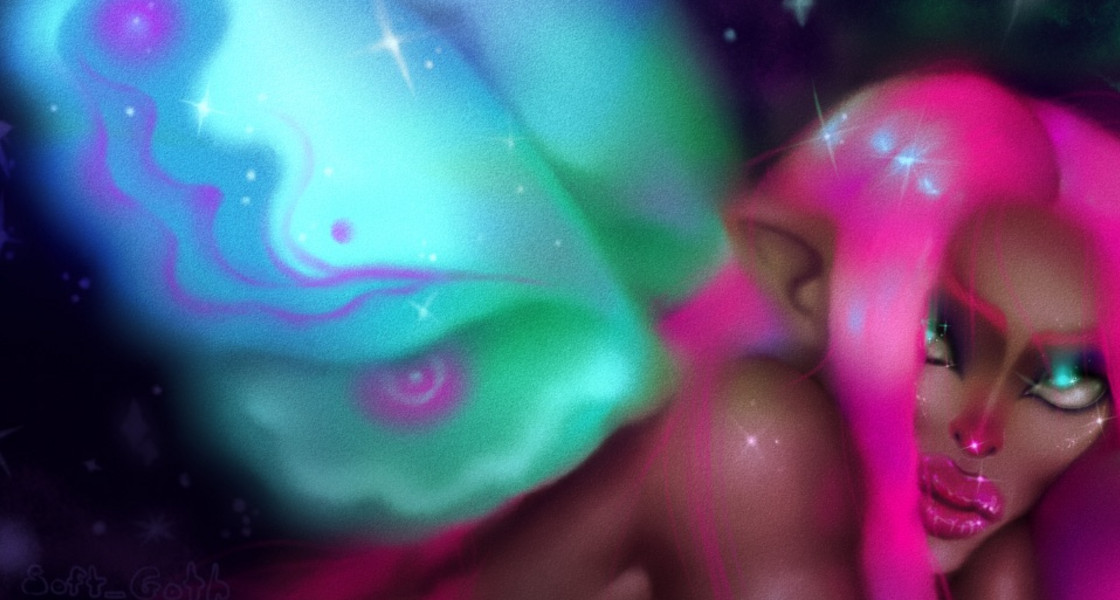
Along with NYMPH, all other content created by THUGPOP will live on his new online platform, ThugPop.farm.
Listen below.

JOHN wears KNITWEAR by FRUITY BOOTY, DRESS/TOP by ASAI, JACKET and SKIRT by MASHA POPOVA, BOOTS by DIESEL
While John has been receiving her fair share of the spotlight, walking fashion shows like Marine Serre and starring in campaigns for Daniel Lee’s Burberry, she’s not phased by the constant attention. Instead, she’s almost unaware of it at times.
“I kind of live in my own world. Someone will recognize me and I will be shocked. I live in my own world and I just make music,” she says. After the release of SHILOH, she crafted a collaborative mixtape called JGSG with New York-based producers Surf Gang, surpassing her UK-specific following and gaining an international audience.
Growing up, the rapper found herself enthralled with many types of music present in her Jamaican home. Often encountering melodies from pop, reggae, and dancehall, she cites Jamaican DJ Super Cat as one of the most important concerts she ever attended. She went alone, not waiting for anyone to tell her they’ve heard of him before. It was on Jamaican Independence day, and it was a no-brainer for John.
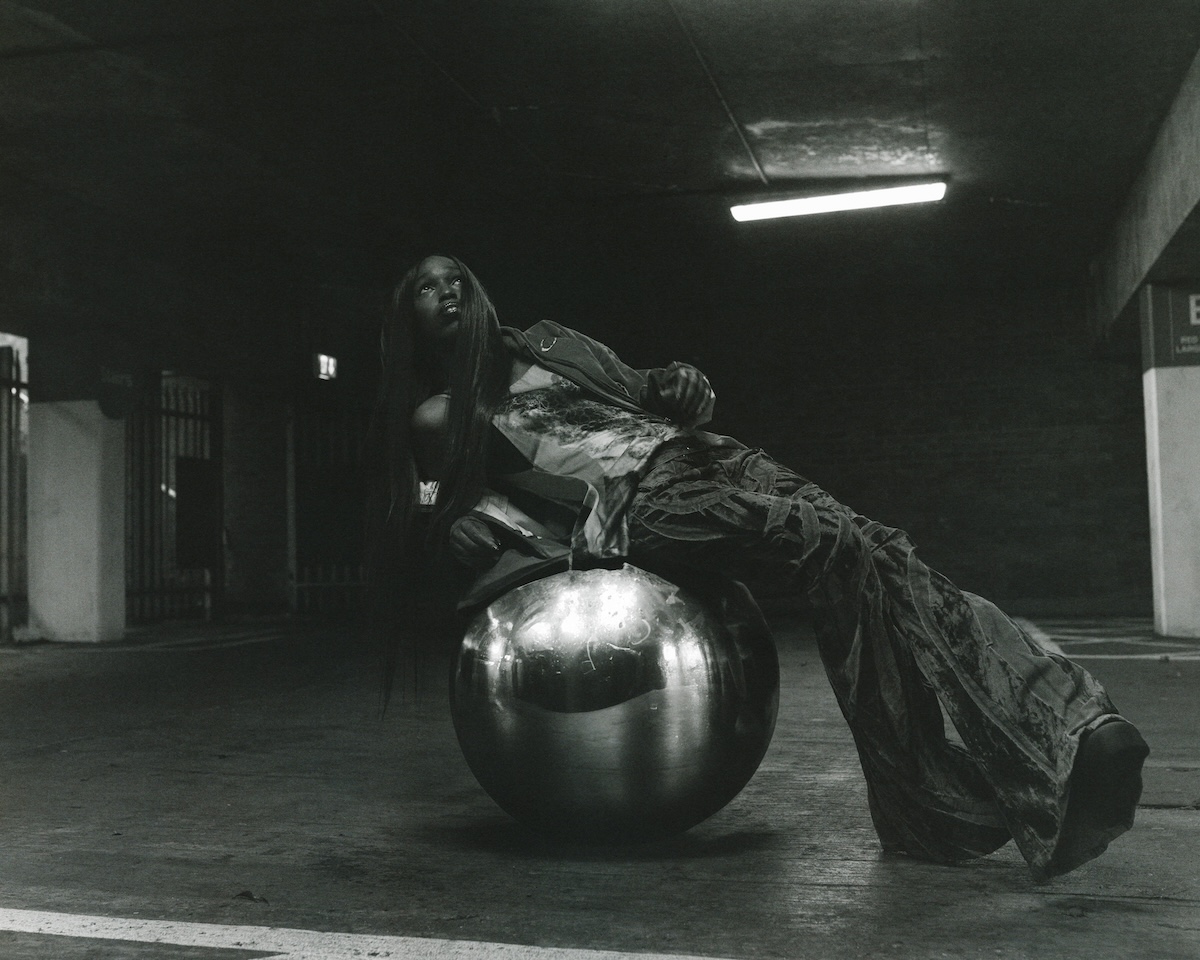
In her new EP, Like A Ribbon, produced by Flume, Vegyn, and Kwes Darko, she’s exploring a new side of herself with upbeat, joyful beats and melodies, writing from a place of welcoming her new life.
“Like A Ribbon is like many running threads that coincide and sometimes they get tangled, then they find a way to untangle, but at the same time you’d like to accept that it was all a part of life,” she said.
The five-song EP, mostly produced by her longtime friend Kwes Darko as executive producer, matches Glacier’s apparent eagerness for life and a cherishing of its everyday moments. Her video for “Money Shows”, which features vocals from singer Eartheater over punk-infused guitar riffs, shows Glacier beginning her manifesto for what life has to offer with lyrics like “show up and I always show out/no doubt I cause I know about ways/long days cause I talk about pain / I’m still running I could talk about strains.” It’s clear that Glacier is on a new path. In the video, the rapper sits in a chair while getting her hair and makeup done for a performance, a direct visual for the energy she’s putting out into the world.
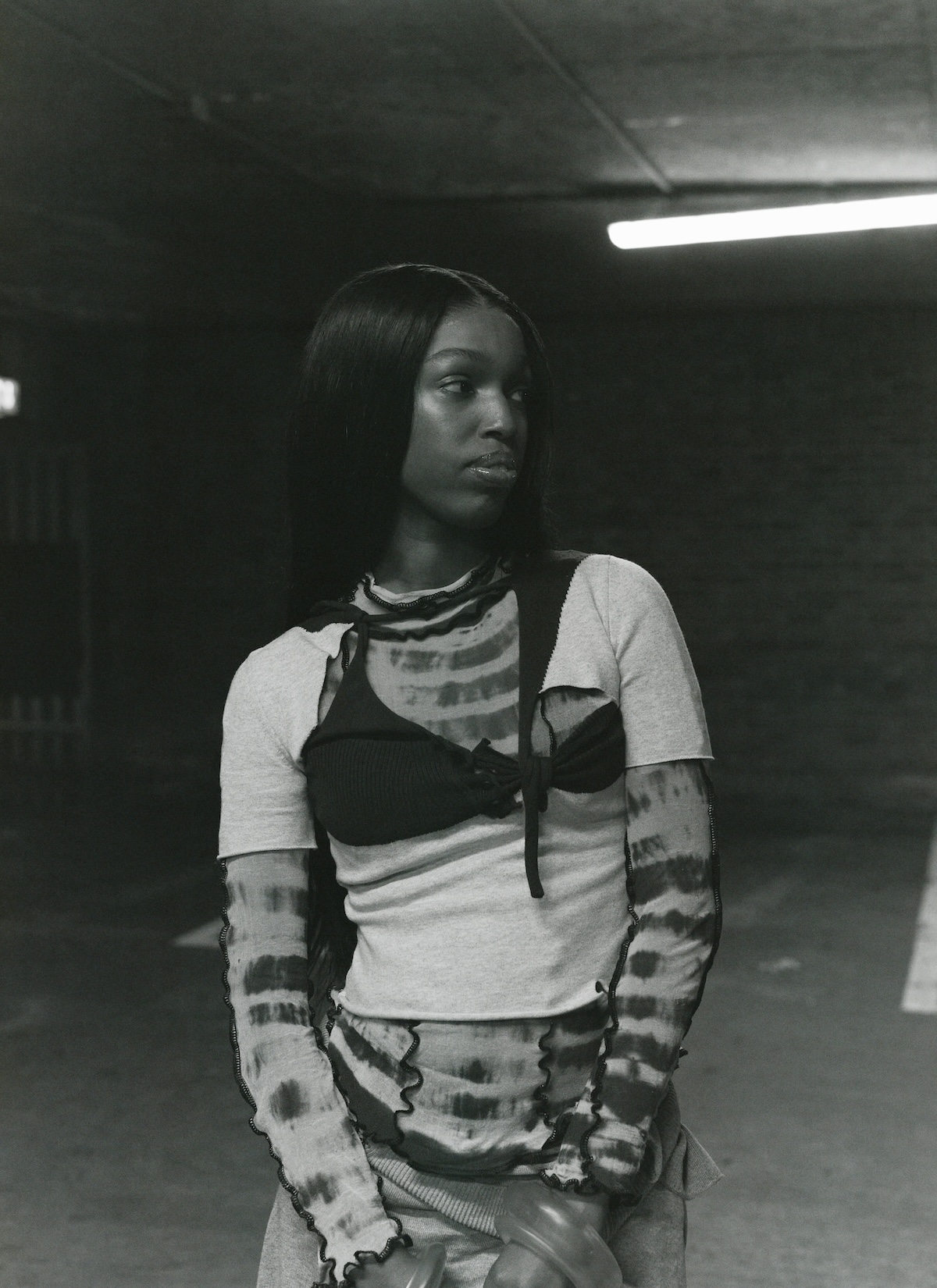
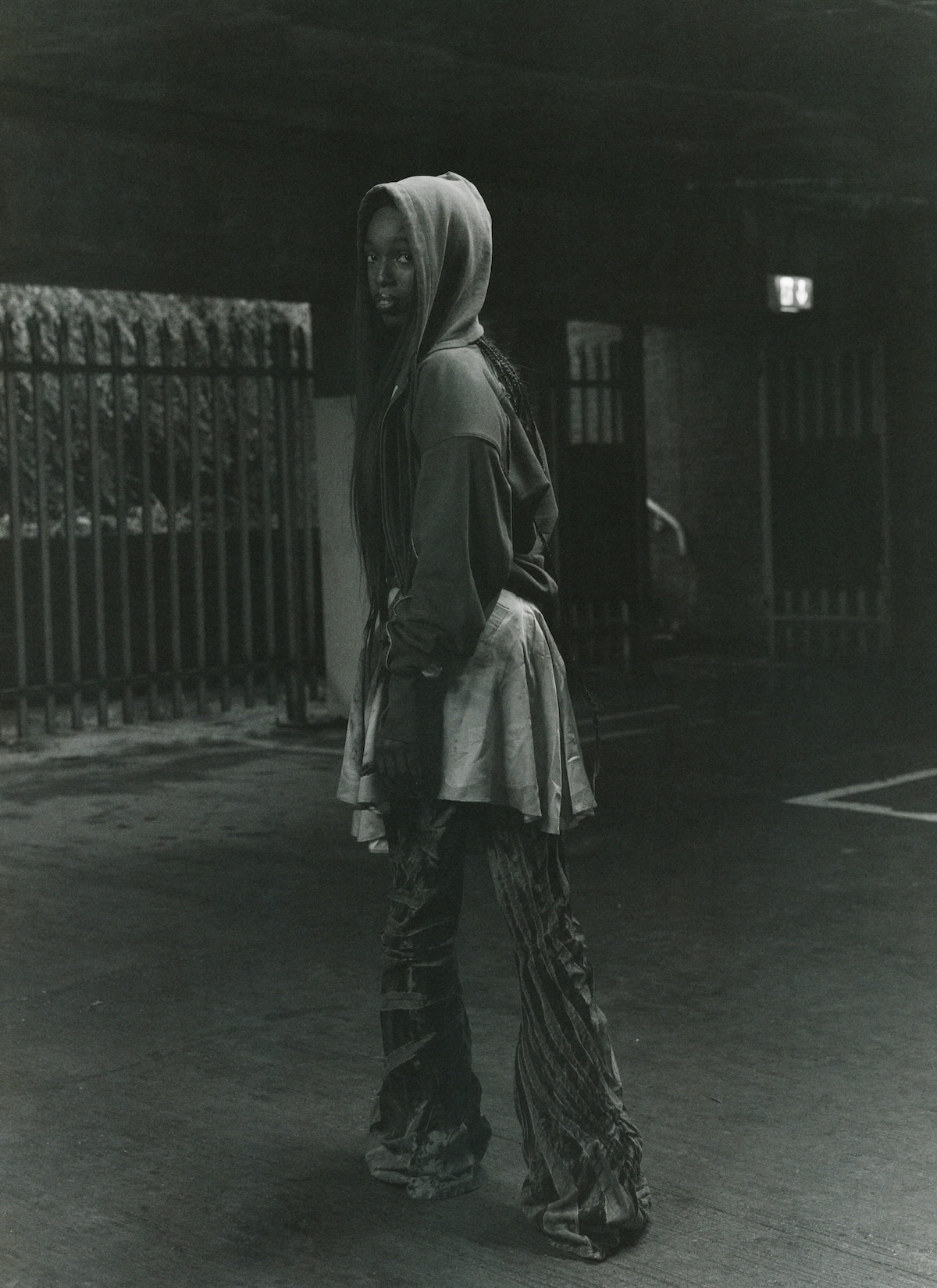
look 1: JOHN wears BLUE TOP by ASAI, GRAY TOP and SKIRT by OTTOLINGER, TROUSERS by COPERNI, SHOES by STEVEN MA, BANGLES by DINOSAUR DESIGN, EARRINGS are STYLIST’S OWN
look 2: JOHN wears HOODIE by SRVC, DRESS by Y/PROJECT, TROUSERS by MASHA POPOVA, BOOTS are TALENT’S OWN
SHILOH’s religious themes ring with biblical references in lyrics like “Gabriel cover me/Under angel wings/Stuck on Calvary,” making me wonder about the rapper’s spiritual life. While she was raised Christian — similar to myself and other first generation Caribbeans — she let go of that label a long time ago.
“I pray every day,” she says, still emulating that one ritual she was taught in her large and loving home. John revealed that she’s a Libra, born on October 21st, the same date as myself, although when I mentioned my transition into a quarter life crisis, John simply replied that she feels ageless. “I feel like certain people when they’re 40, they might feel like they have to live their life differently. When I’m 40, I don’t feel like I’ll feel that way, I’m going to live life how I want to.” She’d been referred to as an old soul all her life, transparently wise, vivacious, and, in her own words, “sparky."
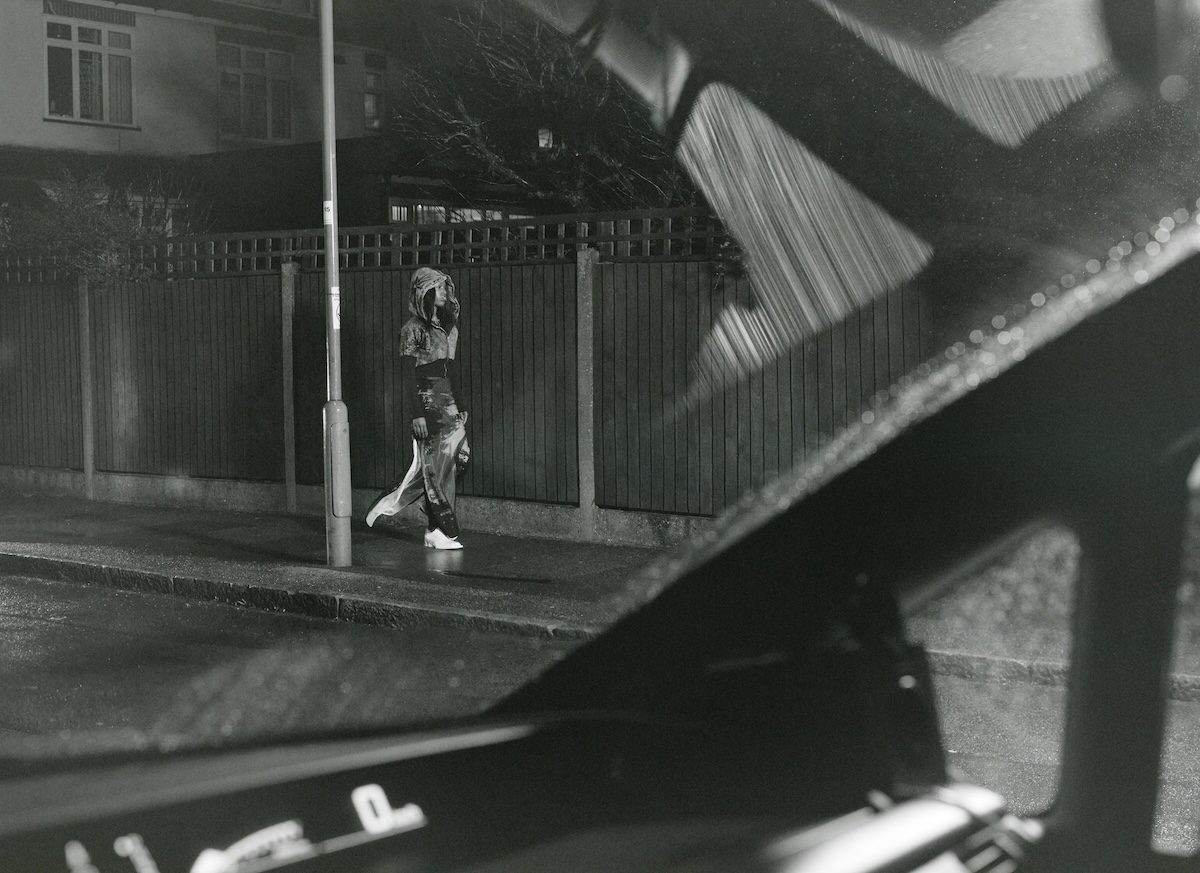
With Like A Ribbon’s follow-up, expect to hear John step into herself, accepting the role she plays while navigating her life experiences — all while remaining true who she is. The whole project is a continuous writing process: subjects of her life glossed over in Like A Ribbon will be thoroughly investigated in part two of the project. Upon this release, anticipate tour dates throughout the U.S., where John’s new optimistic sound will inspire a similar blend of energy just like her childhood home.
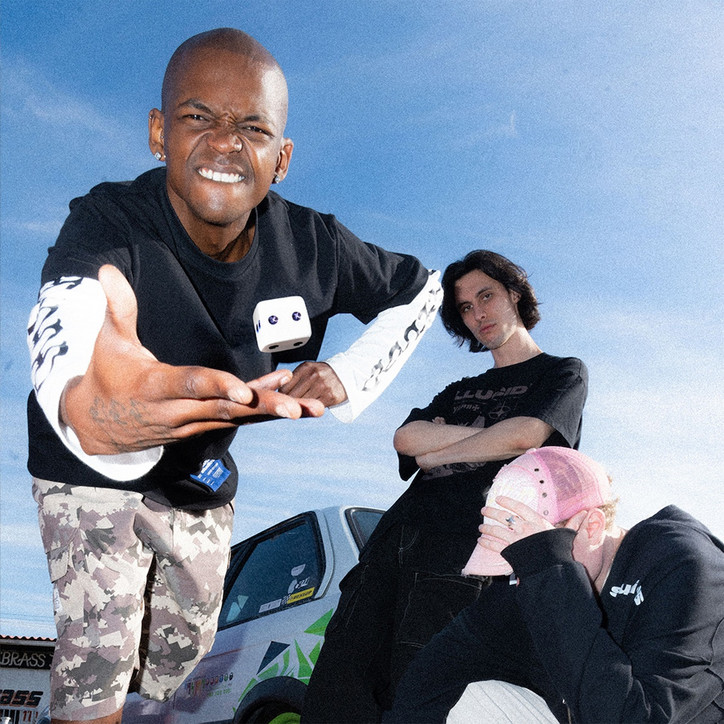
Olivier Lafontant— With a name like Internet Girl, people would have the perception of the group looking a certain way, and I was surprised to find out that there are three dudes under a name like that. How did you guys come up with that name and what’s the audience that you look to attract with it?
Neese— The name was meant to [represent] the type of person that would listen to the music. It wasn't necessarily meant to describe us. At the time when we first started, we were kind of writing a lot of love type, indie pop songs. And it felt appropriate at the time. Nowadays for it to make sense, I think you would have to kind of come up with a reason for it to make sense, but it's still cool, we like it.
Griggs— I think also, how we've grown and changed over the last couple years is the same as how multifaceted the internet is. It contains everything that there is, you know? It’s all-encompassing. I remember [Neese and TK] telling me they were at a restaurant hanging out, getting something to eat and then it just came up quite [nonchalantly] and they were just like, yeah, that sounds cool.
It's pretty clear that the music that you guys make now is reflective of trends that either come from here in the States or in England. What are the challenges that have come with that and how do you guys think your music compares to the artists around you in South Africa?
TK— The biggest problem is people not fucking with it for what it is and just fucking with it for the novelty. I remember for the longest time my black friends would always be like ‘Yo, this music is really white, this is that white shit!’ And I’d be like ‘Is that all you get from it, you don’t really fuck with it?’ And people always then treat you like a prerequisite for something greater, like ‘Aw just keep doing your thing, it’s gonna be dope.’ It just takes a while for people to catch on. But we’ve never been too fazed about that. I think I’d be so disappointed if people just accepted it and there was no conversation around the music, that would be wack.
Neese— I think initially when we were making the indie pop stuff, we were like, ‘Hey, this kind of works in a South African context’ because there were bands making that kind of stuff, you know? And then as we started getting into weirder music––like [How I’m Feeling Now by Charli XCX] was a big turning point––we started making weirder kind of music. We're like, ‘Hey, we don't fit in here, this is gonna be a challenge. We're not gonna get booked for shows. People in our own city are not gonna rock with us.’ Over here people like amapiano and hip hop so it was tough, but I think we're carving out our own lane on the side, kind of building a cult following for the kids that do rock with it. And the kids that do resonate with it really resonate with it hard because it's kind of something that they've seen on the internet, they've seen people do it in the US and in the UK, but they've never really had someone at home to rep that makes what they like. We’re tryna create that scene.
Griggs— In South Africa, people always be coming up to me all the time being like, ‘Man, I don't usually listen to that sort of shit, like that weird shit, but like, I fuck with y'all!’ You know what I mean? I like the idea that what we're doing is also like expanding the musical palette of people from our own country and reshaping what it means to sound like a South African artist.
Who were some of those early influences for you guys that you got off the internet?
Neese— I would say it goes as far back as Skrillex. I have Skrillex's record label tattooed on my arm, I was a huge dubstep head. So that electronic element came through. During the whole bedroom pop phase we fucked really with the the usuals like the Clairos and the Tame Impalas and then that had the influence. We've all also all listened to hip hop and trap, so that also became an influence. So I would say those are the three main things: we listen to a lot of electronic music, a lot of indie, and then a lot of hip hop and trap. And we've kind of decided which one we were gonna do, and now I think it's coming together in a nice cohesive way.
TK— From the very start I would say it’s EDM music ‘cause that was the pretense for me and [Neese’s] relationship, just listening to dubstep or whatever Deadmau5 was putting out at the time. We always just wanted to listen to underground music or just jarring music that no one else like ‘cause I guess it made us feel like we were cooler than everyone. We’ve kept that ethos until today, just looking for what’s fresh and what’s new. Now, personally I would say hip-hop is a big influence for my writing.
Were you discouraged at a certain point when you guys started to cultivate your own sound and you felt that people were pushing back against it or people weren't really accustomed to it? Or have you guys always been hardened in your vision of just trying to accomplish what you want to accomplish?
Griggs— Now people are really starting to recognize us in real life, but it very much used to be a situation of [us] doing well online and we would get these streams and these playlists, but no one in our own country knew us. Like no one was booking us for shows. Our first ever show, we had to put on the event ourselves because no one knew who we were. We just had this online presence completely separated from our real lives. But we’re changing that and starting to bring a real life motion that just exceeds further than online numbers and things like that.
Neese— I think the numbers were a big thing initially for us to keep going 'cause we were like, ‘People are listening to this somewhere out there in the world. No one knows who I am, my family don't recognize it at all, no one really knows what we are doing, but the numbers [were] there so something's going right and we’re just gonna keep doing what we’re doing.’ And eventually people started to catch on.
Griggs— Yeah it's spilling over into real life now, like we go play these shows and not even in our own city, like in a different city in South Africa, and [we play a song that’s] been out for like three days and every single person in the crowd knows it. That wasn't even close to happening a few years ago. So it's cool that it's spilling over and we’re starting to get a bit of love from the place we're from.
In a previous interview, I read that you guys said that your egos were kind of inflated after being signed to your first record deal and you were expecting things to pick up a bit faster than they actually did. What have you learned about yourselves since then?
Neese— Shit.
Griggs— Financial responsibility of a grown-up.
Neese— *laughs* And that the music industry is tough, dude. I don't know, we were young, we were still in university. We were like, ‘Fuck, okay, we got signed, we are gonna fuckin’ blow up, like give us a year, we're gonna be rich and famous. And then we had a really, really tough year. We fuckin’ wasted our entire advance, we went broke, we had to go move back with our parents, we had to figure shit out again. And then we came back into the whole thing with much more humility, thinking this is gonna take a lot more work than we thought it was gonna take. We got signed in 2020, we moved together to Cape Town in 2021, we took the advance and got a lease. Halfway through the year we ran outta money. We couldn't even buy butter to put on our bread and shit, we were putting, like, olive oil.
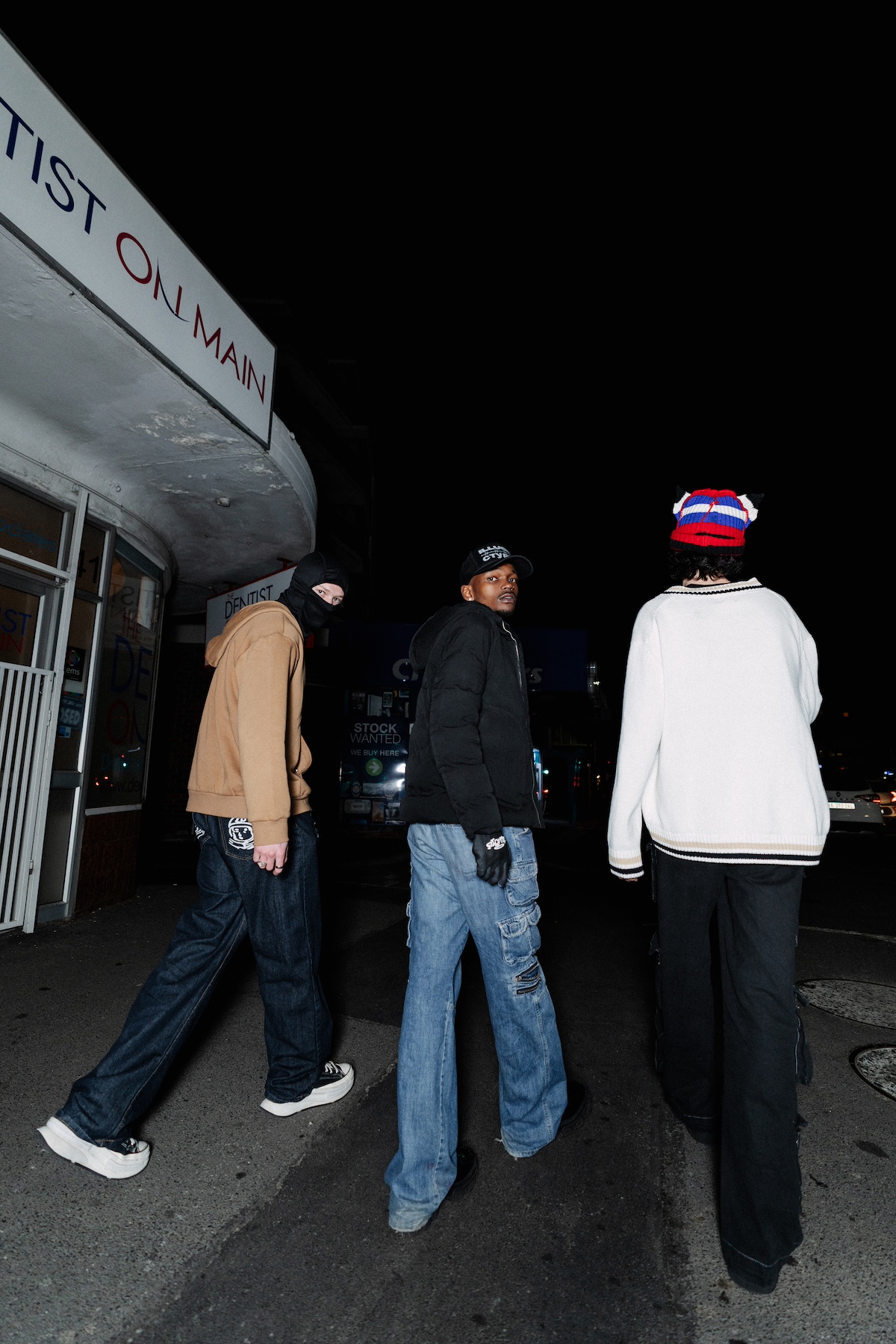
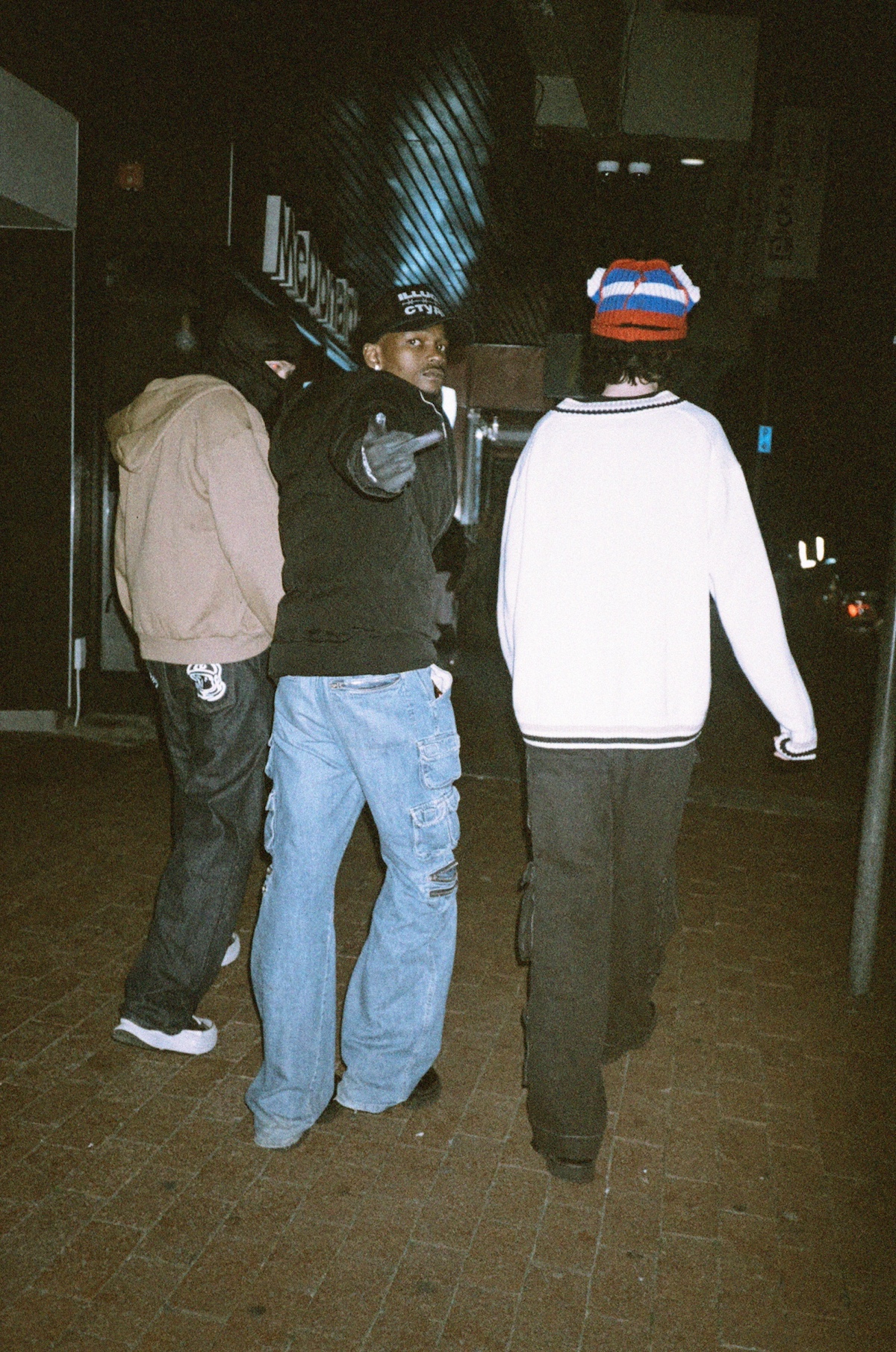
Are you guys concerned with pioneering a new lane or a new type of musical style for South African musicians? Or are you more focused on just evolving individually?
TK— Definitely the latter [for me]. Just in general, in life I’m very focused on evolving as a human being. I think obviously with the love South Africa has shown recently, I’d love to inspire people who feel like they’re similar to me or feel like their story’s the same as mine, and I’d love to pave the way for that. But I’m definitely focused on evolving as an individual.
Griggs— I like the idea of us shaping like a sound for SA and like changing the narrative of what SA music sounds like and can be. Neese: We kind of have a dream of putting on a festival each year that’s birthed from what we created, and we can book artists that were inspired by us and maybe start a label and sign other South African artists that were inspired by what we were doing. So that's a long-term goal. So it definitely is important to us.
Could you speak a bit about the creative process? How does the songwriting inform the production and vice versa? How do you guys kind of piggyback on each other?
Griggs— What's nice about the way we write music at the moment is that writing a song in the creative process comes from every angle. So for “COKEHEAD,” TK basically wrote that entire song and gave it to us. Like he wrote it on guitar, he wrote the lyrics and had this roughly structured song and then gave it to us. And we were like, okay cool, let's tweak a little bit of the guitars, let's figure out the tone and build it up from a song. Everyone's capable of starting a song; me, [Neese], or TK. So the fact that we're able to mix it and move it around all the time is what makes it fun. And we keep coming back to it every day, having a good time writing songs together.
How do you guys feel like the energy from the studio translates to live performances now? Especially now that you guys have an audience that's looking out for you at this point?
TK— It’s very similar, I like to get a lil sauced, I like to get a lil tipsy before I write. I like to be in a different mental state. And with the show, I just go into that state where I just see everyone in front of me and they’re all having a good time. You just really feel that nigga. It’s the same character so it translates really well.
Neese— It's insane. The studio can be a grueling process and live shows are the opposite of the studio. I don't know, it's just adrenaline and fun, it's like a reward for the time you spend in the studio. And the live shows have changed the way we make music. We have a mindset of how is this gonna perform live, how are people gonna react to this live, kind of in the same way that a dance music producer would test out a song in the club and make sure that it's structured right. We kind of approach music like that now.
I think a big defining part of “post-internet” music from our generation is how the songs have gotten a lot shorter, you know? And with the ROLE MODEL EP, it's six songs, it’s barely 15 minutes long––could you talk about the importance of being concise?
Neese— These days you don't need to make long songs, and we do kind of wanna lengthen out the songs maybe a little bit in the future, and structure them out, and have some unique sections. But for “EVERY MAN FOR HIMSELF,” we went through like five or six iterations of drums, so it's like the song is short, but the little specifics of what we really spend time on makes sure that everything is right.
Griggs— Yeah, the song doesn't have to be long. It's like you're hearing pretty much the same drum sound throughout the entire song, but that's days [worth of work], you know what I mean? There’s so many back and forths. And that's like that with everything from drums, synths, bass, guitar, vocals. And we only release a very small fraction of the songs we make, that's also part of the reason why it takes a while.
Was there an emotional breakthrough that you feel like represented how you feel about this project? Was there a certain point where you guys were like, ‘Okay, this is it, this is the direction we're going in now and like we're not looking back.’
Neese— I'm not sure if there was a specific moment. I know 2022, we also had a really bad year, we were kind of all still living apart. We would sometimes go weeks without talking to each other, and then 2023 last year we all moved in together and that was kind of like a fresh start. And I think it made the music making process so much easier. We were all super inspired, we were all super driven and ready to go, and the music just turned out like a lot better than anything else we've made. And then at the end of the project you can look back and be like, ‘Hey, this is definitely the best thing we've ever made.’ And then from that point, you listen back to the old music and you just don't like it anymore, don't want to hear it anymore. A lot of the time we'll play a show and [our fans] are like, ‘Why didn't you play this old song?’ And it sucks because people really connect with those songs but we can't stand them.
Griggs— You can't get on stage and play something [you don’t like]. It's almost fake, you know, pretending to be on stage loving playing the song you actually don't like. So we don't do it. Like there's some of our bigger songs that we don't play, probably never will.
Would you rather perform like unreleased music instead?
Neese— *laughs* That’s what we do.
Griggs— That’s exactly what we do. Like that's how we know this one unreleased song we have is even crazier than we thought it was, 'cause we play it live and it goes insane.
At a certain point you guys are gonna have to start doing shows outside of South Africa. Do you guys feel like that's attainable at this point in your career? Or do you still feel like you have more work to do at home?
Neese— Oh we’re ready, it’s coming. We’re going somewhere in August, we're playing festivals. It's already lined up. And we're in the process of getting visas for the US and hopefully organizing a US tour, but that is something that we really, really want to happen as soon as possible.
TK— I would love to be recognized as the best band or the best act to come out of this continent. It’s all seeming much more possible now than it ever did before. We gotta be a household name when it’s all said and done.
Where are you guys performing in August?
Griggs— Secret.
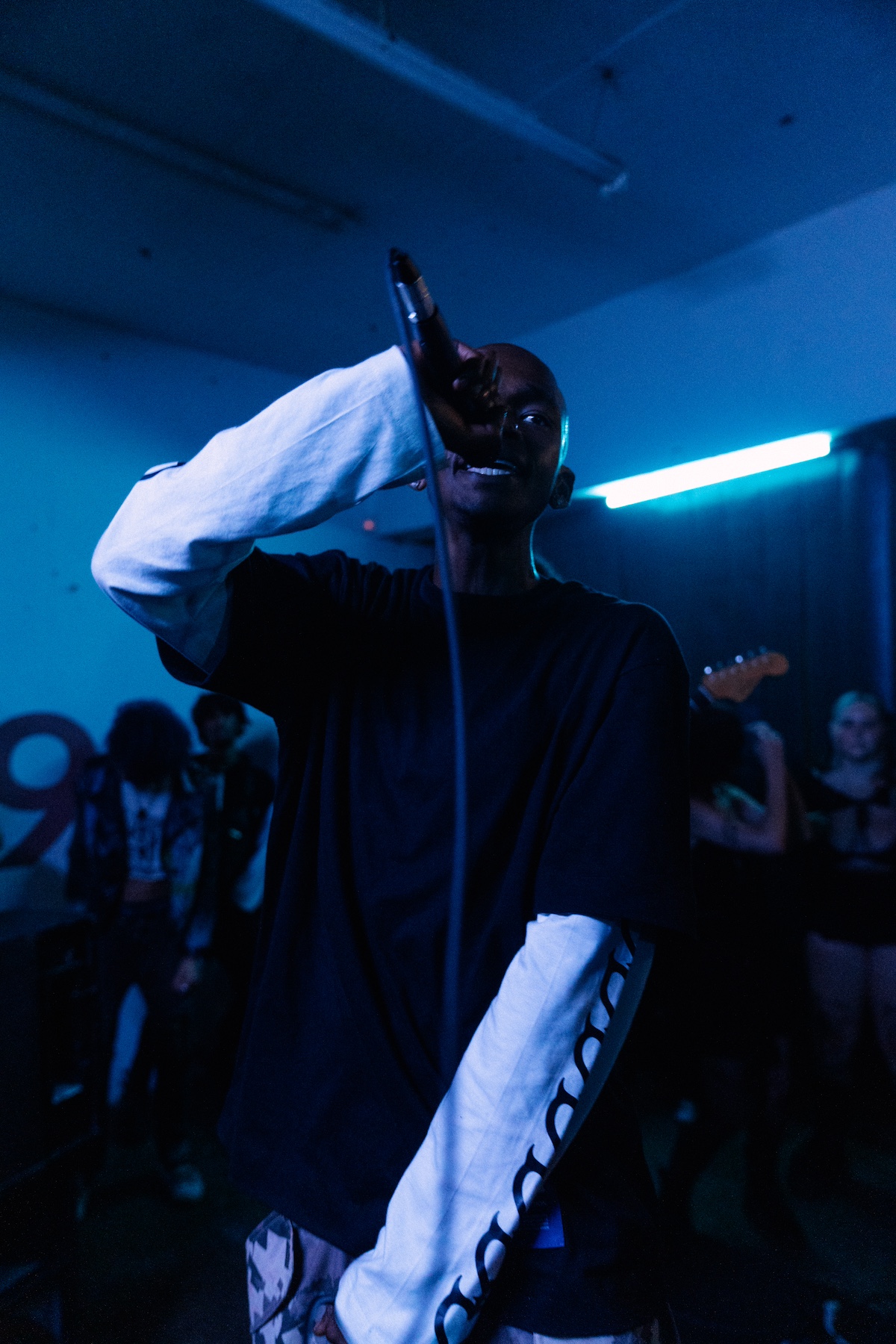
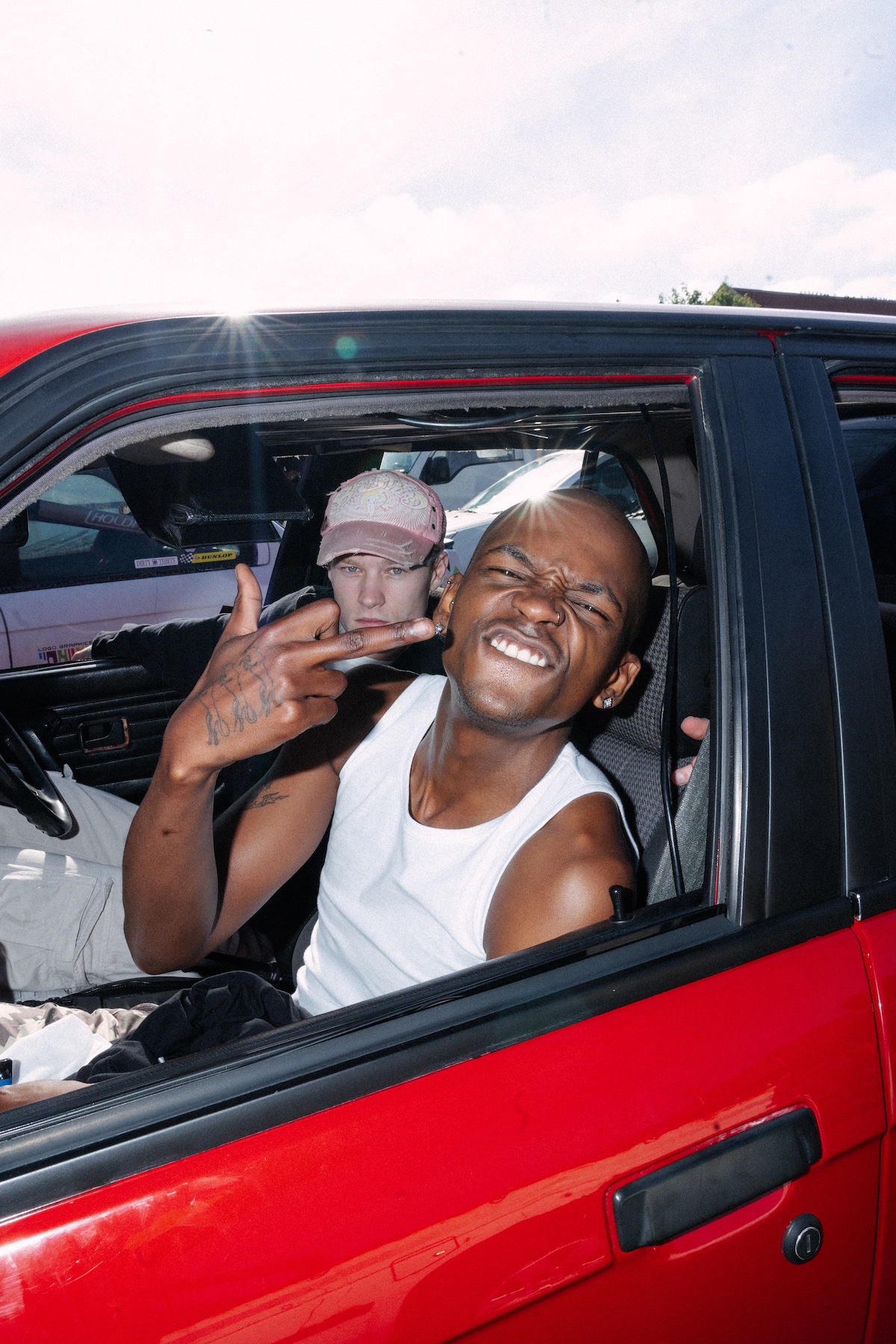
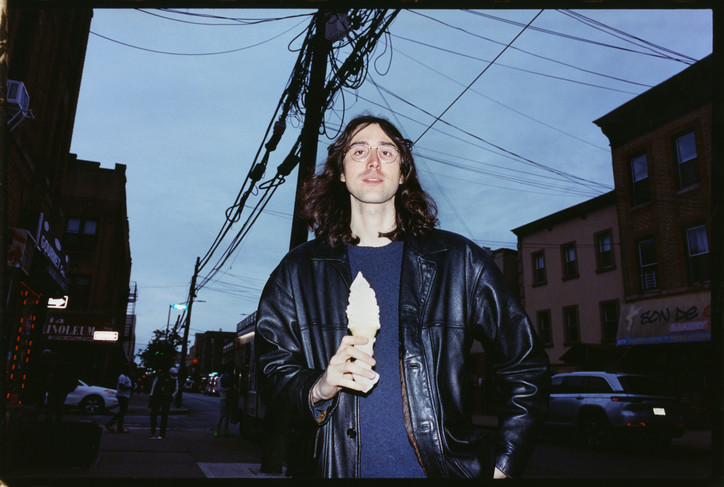
Watching A. G. Cook behind the strange, glass wall of the Viper Room’s green room in Hollywood, the phrase “A. G. Cook is making the impossible possible” kept repeating in my mind. Conspiring against the short attention spans that dictate music releases, Britpop is A. G.’s three disc, 24 track, sci-fi world that collapses boundaries in what feels like an earnest attempt to ensure pop music survives. The show and album alike live beyond the structures of time, simultaneously transporting listeners to the past, present, and future versions of A. G. Cook’s music. Throughout the performance, he transcends genres, livening the dance floor like a rave, bumping tracks like “Out of Time” and electrifying the stage like a rockstar with distorted guitar during “Bewitched.” Although I’d seen him DJ numerous times and witnessed his experimental opening set for Charli XCX, the way he commands his own headlining stage is otherworldly.
For his interview with office, we brought on his collaborator and friend, Caroline Polachek to chat with him about Britpop. If A. G. Cook were the omniscient, Holy Spirit of pop music, Caroline would be one of its major prophets, writing the scripture and deconstructing the presence of pop itself. From her iconic debut album, Pang, to her recent masterpiece, Desire, I Want to Turn Into You, Caroline delivers fantastical tracks imbued with sentimental lyricism. After subsequent nights playing Dungeons & Dragons and attending multiple Caroline and A. G. shows over the years, it’s become pretty obvious that A. G. and Caroline have a friendship that transcends their professional collaborations.
Caroline Polachek— Hey Alex. Where are you right now?
A. G. Cook— I am in LA, but I was recently on the Roadshow which took me to London and New York, very predictable. It’s funny because LA is so abstract, I feel like I’ve moved here 4 or 5 times. I often feel I just landed for the first time even though it’s been about 5 years.
Yeah there’s no connective tissue in the LA mental map. There’s all these islands that aren’t connected to each other. It takes 10 years before they start becoming one map.
And then by that point, I might not even be living here. That would be perfect.
Also, they say that people’s perception of time has to do with how much change there is, so by living in 5 different LA’s you’re just living longer.
Yeah, it feels like that honestly.
Long live A. G. Cook! Length is a really good place to start because this is a long album.
I know it is technically a long album, but it feels shorter than the other albums somehow. When I’ve gone back to listen to it myself occasionally, I think the three sections have such a clear goal and being 8 tracks, they’re these three mini albums that speak to each other. I was so aware of the idea while finishing the tracks. With 7G, it was done by organizing a graph by instrument or something. I really just let 7G happen. Apple was trying to be intentionally confrontational with U-turns and such. This is the first time I tried to make an album that flowed within its sections, and I can imagine someone enjoying specific parts. It’s somehow my most listenable album in a non confrontational way.
It’s three big bites.
Yeah that’s a nice way of putting it.
I want to talk through them chronologically. The first time I listened to the album, I didn’t know if it was a literal chronology of past, present, and future. I trusted that you’d be tricky and mix them up somehow, but listening to it in its own right, I was struck by how pure IDM Disc 1 is.
It’s basically all vocal chops. Charli is the only person who sings in “Britpop,” and she’s essentially singing a vocal chop. “Heartache” sort of has a vocal line, but that was done synthetically. Disc 1 definitely has that IDM influence and it’s represented by vocal chops. No lyrics allowed.
“Luddite Factory Operator” is such a huge flex as a track.
Why do you think that? I’m sometimes worried about that one.
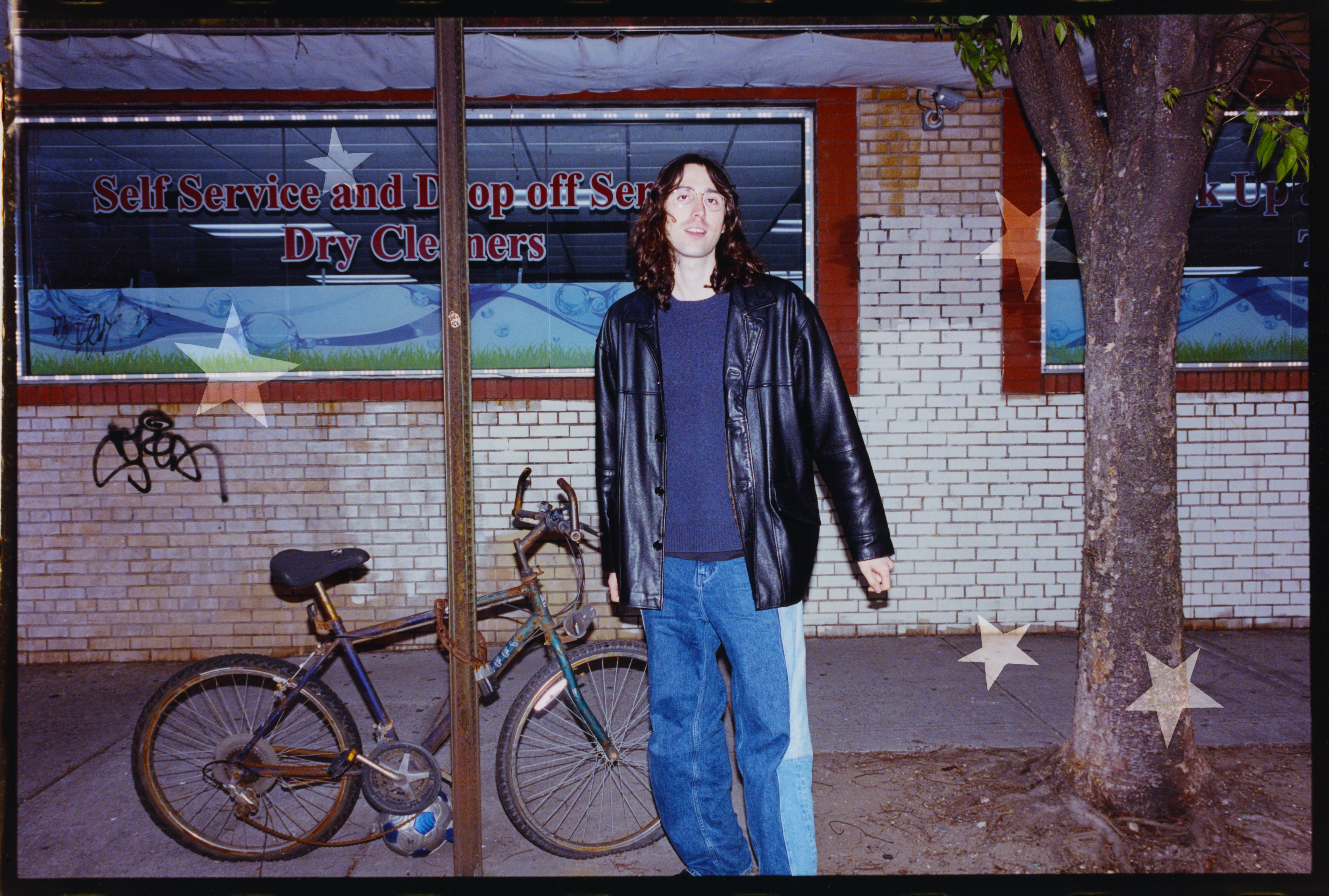
It has so much scope, in how playful it is. From a listener’s perspective, that’s the most rhythmically complex track.
Yeah well “Luddite Factory Operator” is even sadder. A lot of the track names are quite emergent. You know what’s funny? For a while that track was called “Butterfly Net” but then I realized you have a track called “Butterfly Net” which actually didn’t scare me from naming it that.
No, no that would have been perfect. That’s great.
I had this idea of it in a completely different way. In my mind, butterflies are a useful symbol for the past, present, and future. There are so many puns you know like symmetry, butterfly effect, all that stuff. It’s kind of a folkloric creature that has all these other insinuations. We do use it in the “Soulbreaker” video. The magic is represented by these butterflies as they get spliced open.
Also butterflies have three distinct stages in their life.
Exactly that’s the other one. I kind of had it as a sort of allusion, and I ended up calling a different track “Butterfly Craft” The original idea of "Butterfly Net" turned into the World Wide Web, Witchfork, Wandcamp, and Wheatport. As I was making the ideas more and more intricate, I was already wanting to have something with assembly line chops and luddites in it. I wanted something that also stood for LFO from a synthesis point of view. I just let these things happen. I have a ton of personal references and eventually it becomes overbearing. Musically, I was worried about it at some point. I DJ’d it a while ago, and I had it as part of my set. I made it at a time when I started to enjoy making longer tracks as well, so songs like ”Silver Thread Golden Needle '' needed to be longer while others didn’t.
Well “Silver Thread” I was lucky enough to see you play in a different incarnation when you were making source material for the Eckhaus Latta fashion show.
It was mainly made in its entirety for Eckhaus Latta because the brief is a 10 minute walk. I knew it wouldn’t be thrown away. Whenever I have to do a commission, support slot, or a DJ set, I always make edits of songs. Actually, when I was doing my DJ support stuff for you in the Pang era, I remember doing an edit of "Click" by Charli which became “C2.0” on how I’m feeling now. “Britpop” also came from edits of other stuff. Usually if the track works well, I’ll just keep exploring the tracks until it’s given a life of its own.
I hear this especially hearing Cecile [Believe]’s vocal chops and not exactly being able to identify what word from “Show Me What” it is, but feeling the emotion from the song in it. Also, feeling a bit of “XCXOPLEX” and listening to all the synths go back. It’s the DNA rather than the form from your past works.
Exactly that’s why vocal chops are interesting and synthesis is interesting to me. It’s about making the tracks not feel like solid tracks, but closer to a performance. That’s why I like DJ edits and covers. All of these things make a track feel a little more alive. I use this idea of tracks being in conversation with other tracks. It’s a big part of why I’m interested in music in general. Not only is it time based, but there are so many other considerations. It’s a little memory you have to put into context. That’s why so many songs I’ve worked on have these wild outros. I think by that point in the track, it’s so satisfying to see how far I can push a listener by the end once we’ve gotten to know each other.
Yeah there’s definitely a bit of time travel. I almost had a reverse thought when listening to Disc 1. Obviously there’s a bit of a joke when petitioning for all this high tech music as the past, but I felt really emotional about it. Maybe there was a subtle implication of aspiration. Maybe the texture of technology is something that’s been sort of a siren song. I was recently looking at the Solomon seals. On a purely graphic design level, I was thinking how they almost look like charts of cells or different kinds of scientific diagrams.
Someone brought in the Lesser Key of Solomon to the shows in London to sign. I did my most elaborate signature on it and did a sigil seal on the front page with the words “Britpop” in a ring, but yeah that’s so true, I’m so interested in those anachronisms, when you see something from an older era that has a trace or DNA from something contemporary. It’s how these things communicate across time. It’s very real.
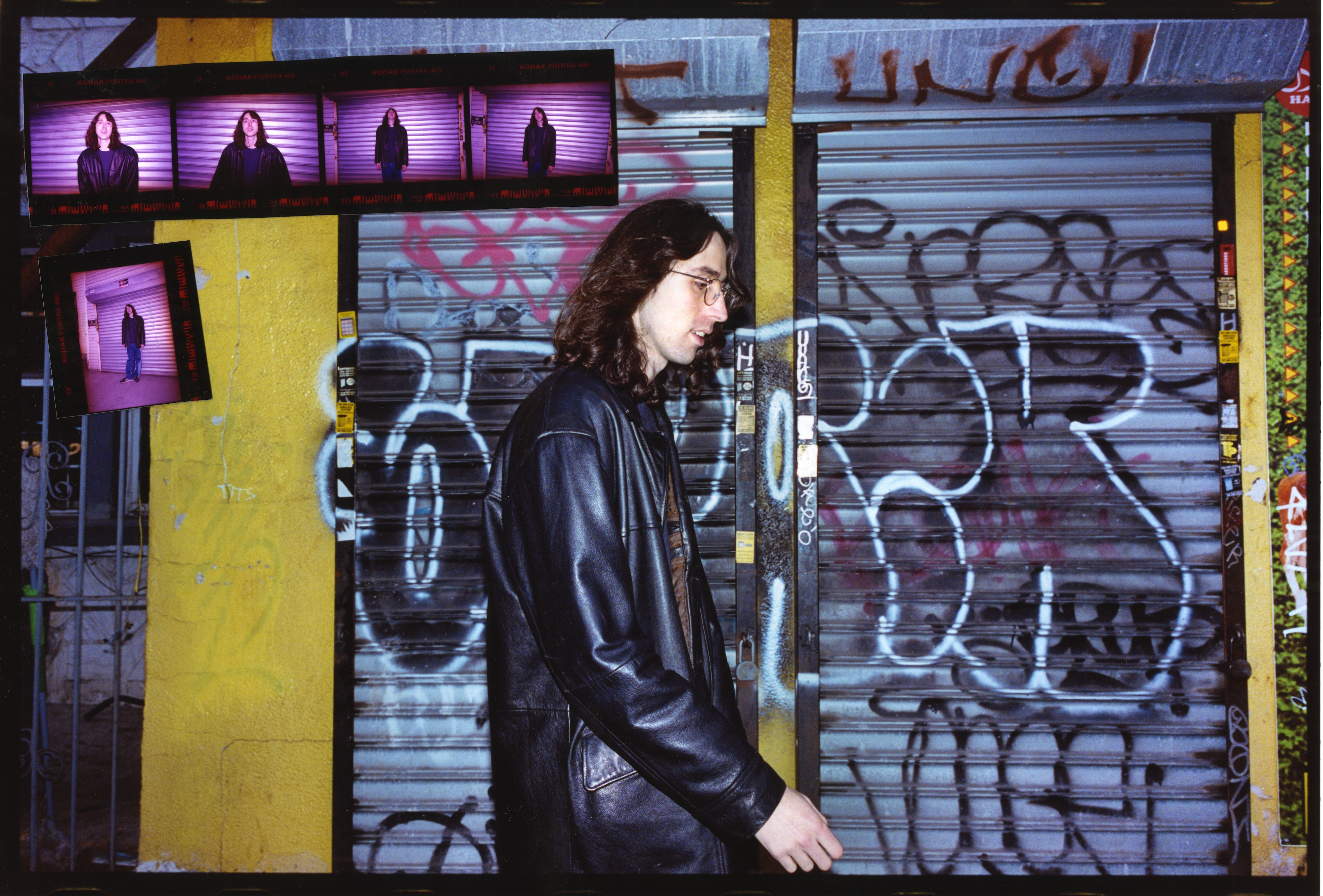
Beyond the synchronicity of it, it’s recognizing how delicious the look and feel of the future is part of innate human desire. I wanted to ask you what your relation to aspiration is in general — do you consider your music aspirational?
Yeah, specifically with Disc 1, on top of the past always feeling shiny, it’s quite literally because I was thinking of when I was making tracks in 2012 - 2014. Just before PC and as it was sort of happening in its early club nights. I was really wide-eyed and genuinely trying to make music that I thought was danceable pop music. In a nice way, I was more innocent, not knowing about the music industry. It was fun for me to see if I could explore the language without doing it in a purely nostalgic way. In a nerdy way, more synthesis techniques, doing things without a computer, or even doing it in a way that’s better executed. Can I take some of the old and show that there has been some passing of time as well as showing tribute to it?
I see people bring up one of my very first interviews I ever did, and loads of what I’m saying is really similar. Even though I had a lot to learn about the mechanics in the industry, in terms of the zoomed out ideas, I was talking about the ambiguity between bedroom production vs slick pop stuff and the performance and theater of these things and also the complexity of it. So much of my attitude, even with PC, is trying to engage with the present. It’s not futuristic or retro. I’m using things like nostalgia as a tool to try and come to terms with what’s going on right now with music. It’s a tool for me to deal with post-streaming landscape and a world where there’s 150K track uploads a day. Is there something I can learn from my 23 year old self when none of that even existed?
I really like what you said about being so fixated on the present because that kind of unlocks something about Disc 3 for me. That’s actually my favorite. It feels like a piñata that’s being cracked open at the end where there’s a real fusion of the ideas introduced in the first two discs.
It’s funny because I’ve seen people say things such as: “shouldn’t ‘Pink Mask’ be on Disc 2?” and that’s kind of the point! The songs aren’t meant to be severed from other discs. There were so many times I thought songs could get moved around, but in the end, I would decide to change things up production wise to lean into the idea of which disc it would live in.
It all points back to the cosmic joke that the future is actually the present. Any conceptions we have about the future are actually just total portraiture of where we are right now.
That’s why it’s interesting reading sci-fi from different eras. It feels a bit futuristic, but sometimes there are objects in it like a payphone. Psychologically, it is a window into that exact time it comes from. Any kind of future / sci-fi stuff is a representation of the present. I was trying to summon something futuristic with those tracks because each one of those makes me a little uncomfortable or unresolved.
I’m not saying Disc 1 and two are nailed, but Disc 3 has tracks that are more experimental and genre ambiguous for myself. Disc 3 I had to question myself and in the end finished most of them not being 100% in the knowledge that it was the right thing. It reminded me of moments in 7G. “2021” or “Crimson and Clover” did the rounds and resonated with people, but I had no idea what to do with them. “Out of Time” was finished last. I was still making it while mixing Disc 2 in Mike Bloodpop’s studio. He has so many modular synths that I don’t know how to use. I really hate sequencers especially when they’re connected to other sequencers. The sounds coming out were genuinely so out of time and I was recording it not knowing its BPM. That process in itself, became so fascinating. I wanted to wrangle this out of time material and give it a four to the floor thing and create tension.
I hate sequencers too and I think it has something to do with commitment. I think I’m a classic millennial that likes to have as many options until the very end as possible. There's an interesting philosophical relationship between the kind of commitment that a sequencer would put you in, and also how it is being a dungeon master in Dungeons & Dragons where you have this narrative that you’re stuck with and you have to sequentially add to them. With everything provided, you just have to work with. I’m outing you, by the way, as a killer DM.
I know I need to get a game going again. There’s a lot of talk about me being sort of the master of dungeons but I’ve been really busy. What’s been nice about D&D and the scene around it, aside from the fantasy, memorabilia and some of the videos and lyrics, is this idea of letting go of control in some way and having faith in it just being interesting. I'm not someone who's constantly improvising in my music, I'm not always jamming. I love the idea of embracing a bit of “yes and” kind of chaos into something. I think the Disc 3 tracks really have that.
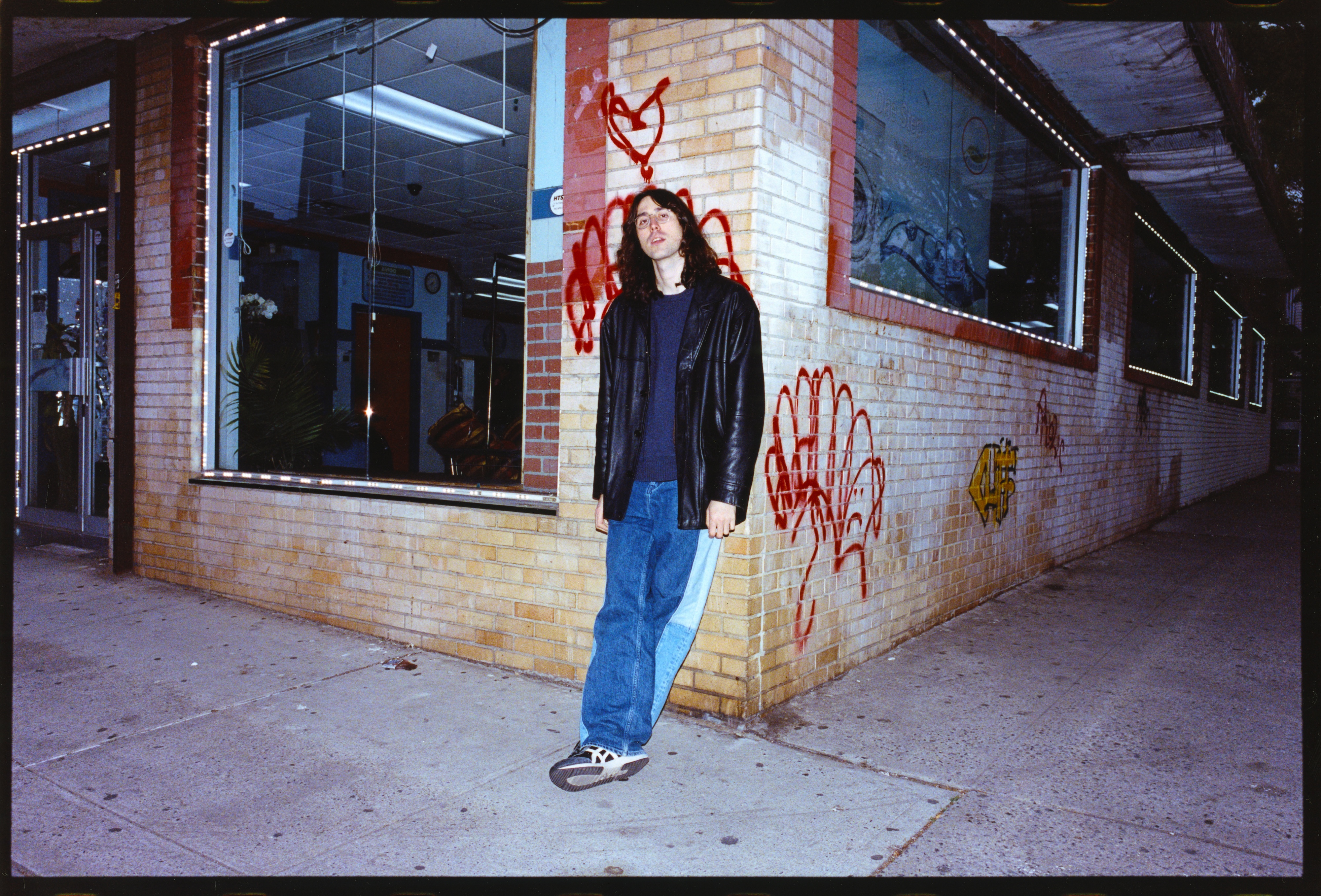
I was really feeling while listening to this album, mostly in the car, that although it uses so much of the electronic language of club music, it's by no means just a club album. Obviously, you're going to do all sorts of edits of this material that are going to rock out so hard on festival main stages, throughout the whole summer, but the record feels like it's built for journeying, like for driving in a car or for gaming. There's a kind of thrilling discovery, and wonder. Going back to the live show, by presenting it in this format, where it's hybridized with rock, it stays very true to this idea of journeying.
The live show is all about the extreme dynamics. It started to feel good in rehearsals when I thought, “Is this setlist even possible?” There's moments in the set, where it feels a bit risky, but I like that. It's a really nice thing to do with an audience. I'm DJing my own weird edits of things I've made. I'm not traditionally mixing or using headphones, the audience hears what I hear, but that doesn't stop me from trying to go straight into something else. That's genuinely what I enjoy when I see electronic music performed. It's also why I struggle to get into something like techno, but at the same time, I'd find the use of the exact same materials thrilling because it's chaotic.
I think you sort of just hit the nail on the head. Something that I think is special about how you work: In all the times I've had in the studio with you, you don't really tend to use the words good or bad. You don't think about music as objectively good or bad.
I think that's a trap, isn't it? When I'm even listening to random music on the radio, I feel I can always pull from songs I hear. I can find almost anything interesting, basically. Yeah. So that's really a blessing.
Yeah, I was gonna say that to you. There's not a good or bad spectrum. It's an interesting versus interesting spectrum.
I saw this guy, Graham Harman, talk about object-oriented ontology, whatever, I'm going to fast forward. But what he said that interested me is that the opposite of beauty isn't ugliness, it's the literal, right? If something is just posited as one thing, you know? And I really agree with that. I don't see the spectrum of good or bad in that way. Music that is overconfident or slick can be a bit dull to me. On the contrary, anything that is about layering or questioning is objectively beautiful. It's why we can find nature beautiful, because all this stuff is going on. Beauty is actually related to this layering. A kind of battle against the literal.
This also brings me to very selfishly ask about my favorite song in the album, which I think has a lot to do with what you're just speaking about. I also find it in very non-literal terms, the most beautiful song, which is a song called “Pink Mask.” It kind of gives me goosebumps, because I think it's one of the only songs that you've made that gives me this really strong sense of arrival and maybe it's that the lyrics are really describing this, this encounter of arriving and asking someone to remove their pink mask. There's something terrifying about asking someone to take the mask off because on one end, there's so much risk in that question and so much anticipation in what you're gonna experience. It feels kind of religious and also so theatrical and the tactility of the frost on the glass. I just wanted to ask you about that song in general.
It's so over the top that one and I think I've always liked it, but I remember it felt like a bit of a risk. A lot of the inspiration also comes from spending time with Alaska and seeing her write lyrics first. She has a song describing being trapped in amber. “Pink Mask” doesn't sound to me at all like an Alaska song, but I remember being in Montana seeing her assemble things lyric first. I think that was a real experiment for me, because usually lyrics to me are a big afterthought. I really wasn't overthinking it, but I was trying to see if I can do something by writing first.